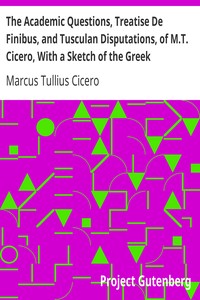The Academic Questions, Treatise De Finibus, and Tusculan Disputations, of M.T.…
"The Academic Questions, Treatise De Finibus, and Tusculan Disputations" by M.T. Cicero is a philosophical treatise written in the late 19th century. This work includes translations and discussions of various philosophical ideas attributed to Socrates and other ancient Greek philosophers, addressing topics such as ethics, virtue, and the nature of the good life. Cicero aims to present philosophical ideals in a form accessible to his contemporaries, emphasizing the importance of philosophy for
personal and societal improvement. At the start of this collection, Cicero introduces the intent behind his work as he converses with friends discussing the necessity and value of engaging with philosophy, particularly the Greek philosophical traditions. The opening portion recounts a dialogue in which Cicero's friend, Varro, discusses his own philosophical pursuits and the reasons behind his writing. The discussion navigates through the significance of philosophy in contemporary life, its historical roots, and the challenge of expressing complex ideas in Latin. The participants reflect on the influence of previous philosophers, including Socrates and Plato, and the importance of translating and discussing these ideas in their native language to enrich their understanding and practices. (This is an automatically generated summary.)
Read now or download (free!)
| Choose how to read this book | Url | Size | ||||
|---|---|---|---|---|---|---|
| Read online (web) | https://www.gutenberg.org/ebooks/29247.html.images | 1.4 MB | ||||
| EPUB3 (E-readers incl. Send-to-Kindle) | https://www.gutenberg.org/ebooks/29247.epub3.images | 595 kB | ||||
| EPUB (older E-readers) | https://www.gutenberg.org/ebooks/29247.epub.images | 625 kB | ||||
| https://www.gutenberg.org/files/29247/29247-pdf.pdf | 3.1 MB | |||||
| EPUB (no images, older E-readers) | https://www.gutenberg.org/ebooks/29247.epub.noimages | 573 kB | ||||
| Kindle | https://www.gutenberg.org/ebooks/29247.kf8.images | 1.1 MB | ||||
| older Kindles | https://www.gutenberg.org/ebooks/29247.kindle.images | 1.0 MB | ||||
| Plain Text UTF-8 | https://www.gutenberg.org/ebooks/29247.txt.utf-8 | 1.2 MB | ||||
| Download HTML (zip) | https://www.gutenberg.org/cache/epub/29247/pg29247-h.zip | 581 kB | ||||
| There may be more files related to this item. | ||||||
About this eBook
| Author | Cicero, Marcus Tullius, 107 BCE-44 BCE |
|---|---|
| Translator | Yonge, Charles Duke, 1812-1891 |
| Title | The Academic Questions, Treatise De Finibus, and Tusculan Disputations, of M.T. Cicero, With a Sketch of the Greek Philosophers Mentioned by Cicero |
| Note | Reading ease score: 53.2 (10th to 12th grade). Somewhat difficult to read. |
| Language | English |
| LoC Class | PA: Language and Literatures: Classical Languages and Literature |
| Subject | Ethics -- Early works to 1800 |
| Subject | Happiness -- Early works to 1800 |
| Category | Text |
| EBook-No. | 29247 |
| Release Date | Jun 26, 2009 |
| Most Recently Updated | Jun 20, 2020 |
| Copyright Status | Public domain in the USA. |
| Downloads | 416 downloads in the last 30 days. |
| Project Gutenberg eBooks are always free! | |

